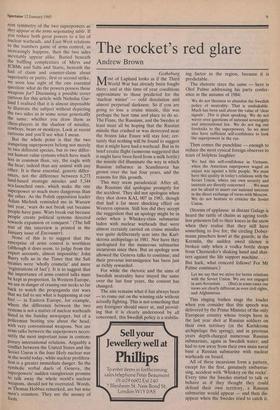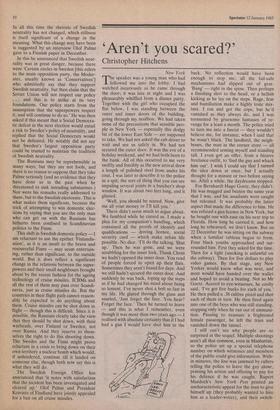The rocket's red glare
Andrew Brown
Gotheburg Most of Lapland looks as if the Third World War has already been fought there; and at this time of year conditions approximate to those predicted for the 'nuclear winter' — cold desolation and almost perpetual darkness. So if you are going to lose a cruise missile, this was perhaps the best time and place to do so. The Finns, the Russians, and the Swedes at least must all be hoping that the Russian missile that crashed or was destroyed near the frozen lake Enare will stay lost; cer- tainly that nothing will be found to suggest that it might have had a warhead. But in its brief erratic flight (someone suggested that it might have been fired from a milk bottle) the missile did illuminate the way in which Russian influence in Scandinavia has grown over the last four years, and the reasons for this growth.
This may seem paradoxical. After all, the Russians did apologise promptly for the accident. They did not apologise when they shot down KAL 007 in 1983, though that bad a far more shocking effect on Western opinion. Still less did they accept the suggestion that an apology might be in order when a Whiskey-class submarine laden with nuclear warheads that were almost certainly' carried on cruise missiles was quite deliberately sent into the Karl- skrona archipelago in 1981. Nor have they apologised for the numerous submarine incursions since then. But an apology now allowed the Geneva talks to continue; and their previous intransigence has been just as richly rewarded.
For while the rhetoric and the aims of Swedish neutrality have stayed the same over the last four years, the content has changed.
The aim remains what it has always been — to come out on the winning side without actually fighting. This is not something that any foreigner should sneer at, and provid- ing that it is clearly understood by all concerned, this Swedish policy is a stabilis- ing factor in the region, because it is predictable.
The rhetoric stays the same — here is Olof Palme addressing his party confer- ence in the autumn of 1984:
We do not threaten to abandon the Swedish policy of neutrality. That is unshakable. Much has been said about the value of 'clear signals'. This is plain speaking. We do not waver over questions of national sovereignty and international law. We do not tug our forelocks to the superpowers. So we must also have sufficient self-confidence to look the superpowers in the eye.
Then comes the punchline — enough to reduce the most cynical foreign observer to tears of helpless laughter:
We had this self-confidence in Vietnam, when the American superpower waged an unjust war against a little people. We must have this quality in today's relations with the Soviet Union, where our own security and interests are directly concerned. . . We must not be afraid to assert our national interests in the direct exchange of views with Moscow. We do not hesitate to criticise the Soviet Union.
(Storms of applause: in distant Gulags is heard the rattle of chains as ageing tooth- less prisoners fall to their knees in the snow when they realise that they still have something to live for; the circling Dober- mann pinschers howl at the guards; in the Kremlin, the sudden awed silence is broken only when a vodka bottle drops from Chernenko's shaking hand and shat- ters against the life support machine. . . . But hark, what concord follows! For Mr Palme continues:)
Let me say that we strive for better relations with the Soviet Union. We are not engaged in anti-Sovietism. . . (But) in some cases our views are clearly different,as over civil rights, and Afghanistan.
This ringing bathos rings the louder when you consider that this speech was delivered by the Prime Minister of the only European country whose troops have in the last year shot at Russian soldiers on their own territory (in the Karlskrona archipelago this spring); and in previous years depth-charged numerous Russian submarines, again in Swedish water: and had to tow away from their own main naval base a Russian submarine with nuclear warheads on board.
All of these incursions form a pattern, except for the first, genuinely embarras- sing, accident with 'Whiskey on the rocks'. Every time the Swedes started to talk or behave as if they thought they could defend their own territory, a Russian submarine would appear — and then dis- appear when the Swedes tried to catch it. In all this time the rhetoric of Swedish neutrality has not changed, which stillness is itself significant of a change in the meaning. What this change may have been is suggested by an interview Olof Palme gave to a Finnish paper in December.
In this he announced that Swedish neut- rality was in great danger, because there were `Certain circles in Sweden [this refers to the main opposition party, the Moder- ates, usually known as 'Conservatives'] who admittedly say that they support Swedish neutrality, but then claim that the Soviet Union will not respect our policy . . . and this is to strike at its very foundations. Our policy starts from the assumption that the superpowers respect it, and will continue to do so.' He was then asked if this meant that a Social Democra- tic defeat in the next election would entail a risk to Sweden's policy of neutrality, and replied that the Social Democrats would not be defeated. He notably did not say that Sweden's largest opposition party could be trusted to maintain the tradition of Swedish neutrality.
The Russians may be reprehensible in many ways, but they are not fools, and there is no reason to suppose that they take Palme seriously (and no evidence that they have done so in the past when he threatened to sink intruding submarines.) Nor were his remarks really addressed to them, but to the Swedish electorate. This is what makes them significant, because the trick of attempting to win domestic elec- tions by saying that you are the only man who can get on with the Russians has hitherto been confined in Scandinavian politics to the Finns.
This shift in Swedish domestic policy — I am reluctant to use the epithet 'Finlandis- ation', as it is an insult to the brave and resourceful Finns — may seem entertain- ing, rather than significant, to the outside world. But it does reflect a significant change in the relations between the super- powers and their small neighbours brought about by the recent fashion for the ageing technology of cruise missiles. ICBMs. and all the rest of them may pass over Scandi- navia, just as cruise missiles do. But the countries in their flight path cannot reason- ably be expected to do anything about them. Cruise missiles can be shot down in flight — though this is difficult. Since it is possible, the Russians clearly take the view that they should be shot down, with their warheads, over Finland or Sweden; not over Russia. And they reserve to them- selves the right to do this shooting down.
The Swedes and the Finns might prove reluctant in a crisis to bring down on their own territory a nuclear bomb which would, if unhindered, continue till it landed on someone else, though both now say this is what they will do.
The Swedish Foreign Office has announced that 'it notes with satisfaction that the incident has been investigated and cleared up.' Olof Palme and President Koivisto of Findland have jointly appealed for a ban on all cruise missiles.







































 Previous page
Previous page